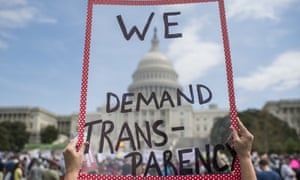The president’s tax documents have been reported on by various outlets, even winning the New York Times a Pulitzer

Photograph: Tom Williams/Getty Images
The US supreme court is in its second week of working by telephone during the coronavirus pandemic. On Tuesday it will hear the highest-profile arguments so far presented remotely: regarding the release, or not, of Donald Trump’s tax returns.
When Trump ran for president in 2016, he bucked tradition by refusing to release such information. Saying he was under audit, which would not in fact have precluded action, he promised to release his returns in due course. He has not.
Details of the president’s tax affairs have been reported by various outlets, the New York Times won a Pulitzer in 2019 for a wide-ranging investigation which the prize committee said “debunked [Trump’s] claims of self-made wealth and revealed a business empire riddled with tax dodges”.
But Trump’s taxes remain one of the most tantalising mysteries in American politics.
On Tuesday, the supreme court will hear cases originating in Congress and New York state. Both seek records from Mazars USA, Trump’s accountants.
Democrats, who control the House of Representatives, want access to the Republican president’s tax returns, records and financial statements, to see if he is violating constitutional safeguards and federal ethics laws by benefiting financially from his occupation of the White House via his business empire.
The New York prosecutor Cyrus Vance Jr wants to know more about Trump’s payoffs to women who claimed affairs with him, and whether such hush money payments involved the falsification of business records.
Trump’s lawyers contend that the president is not required to release such information, that he is immune from criminal prosecution while in office, and that Congress is trying to limit his power.
In a New York appeals court last October, Trump attorney William Consovoy went so far as to say that if the president carried out his famous notion of shooting someone “on Fifth Avenue”, to see if it cost him support, he could not be prosecuted by local authorities.
Critics contend that no American citizen is above the law.
Writing for the Washington Post, the Republican lawyer and Trump critic George Conway – who is married to the White House counselor Kellyanne Conway – said: “Trump’s position stupefies. In essence: authorities can’t investigate anything touching his personal affairs – including, ahem, payments to pornographic actresses – because he’s president.
“Think of the logic: Not only does the president enjoy a personal constitutional immunity – his businesses do, too.”
In a column for Bloomberg News, Trump biographer Tim O’Brien pointed to the fact that Trump has surrendered tax records before.
When Trump sued O’Brien for libel in 2006, a suit dismissed in 2011, he “resisted releasing his tax returns and other financial records”.
But, O’Brien wrote, “my lawyers got the returns, and while I can’t disclose specifics, I imagine that Trump is hesitant to release them now because they would reveal how robust his businesses actually are and shine a light on some of his foreign sources of income.”
Trump’s relationship with Deutsche Bank has been one subject of fascination and investigation, given that it is the only major world bank that has loaned him money since the 1990s and given its extensive links to money laundering and Russia.
Special counsel Robert Mueller obtained records from Deutsche Bank during his investigation of Russian election interference and links between Trump and Moscow. Mueller did not establish a criminal conspiracy but also said he was not exonerating the president.
The decision over Trump’s tax returns will have dramatic implications, whichever way it falls.
Conservatives hold a 5-4 majority on the court thanks to Trump’s appointments of Neil Gorsuch, to fill the seat vacated by the death of Antonin Scalia and held open by the Senate majority leader, Mitch McConnell, and Brett Kavanaugh, who replaced the retiring Anthony Kennedy.
In an email, the former Clinton aide and Guardian contributor Sidney Blumenthal said: “The case is potentially an existential threat to Trump. He’s a desperate man on the run, one step ahead of the law.
“If he were to lose the election he would likely face prosecution for a variety of crimes including financial fraud. His immunity would end the moment that Joe Biden becomes president. ”
If the court sides with Trump, presidential power will vastly expand.
Blumenthal said such a ruling “would exalt the authoritarian theory of the so-called ‘unitary executive’, abdicate the responsibility of an independent judiciary and degrade the court’s reputation as little more than a partisan instrument”.



